The MPLAN PEARL Award is given for the Pursuit of Excellence in the Assessment and Recognition of prior Learning.
PEARL 2014: The Opticians of Manitoba
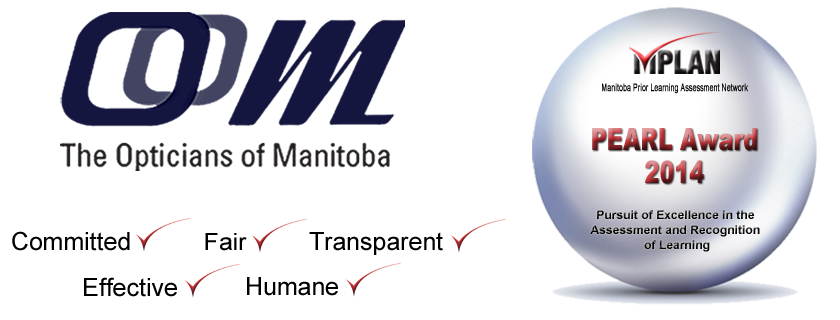
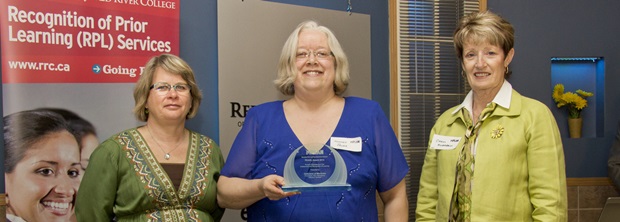
Background for this Award
Opticians supply and dispense lenses for glasses and contact lenses. OOM regulates the profession in Manitoba. It ranks 30 out of 37 among regulators in terms of membership and staff.
Pursuit of Excellence
Over four years, OOM designed, built and field tested much fairer, faster, more effective and accurate ways to assess and credit the prior learning of Internationally Educated Opticians including:
- Paper credential review→ gap analysis→structured interview→ Decision Letter →gap training/national exam → registration
- Assessment of prior language learning in a realistic, timely and effective way to determine each individual current English language skills in relation to language demands of the profession.
- OOM developed a new website at www.opticiansofmanitoba.ca which improved awareness of and access to RPL Processes. It is user-friendly and uses Plain Language, with a welcoming tone.
Results Achieved
OOM reduced the time needed for accurate RPL assessment to a period of four to seven months.
All of the above reforms mean reduced time, cost and stress not only for the applicant but for OOM also. They were accomplished with advice and help from outside but made possible by an immense volunteer effort by OOM members:
- Already there have been over 400 hours donated voluntarily by trained opticians in the design and field testing of these changes.
- Ongoing commitment by volunteers makes the new system possible.
OOM is seen by MPLAN as a potential model for other regulators in terms of rapid and effective RPL self reform.
Acknowledgements
OOM rethought its RPL policies and redesigned its practices with generous support from the National Association of Canadian Optician Regulators (NACOR) and from the Office of the Manitoba Fairness Commissioner (OMFC).
PEARL 2014: Red River College RPL Services
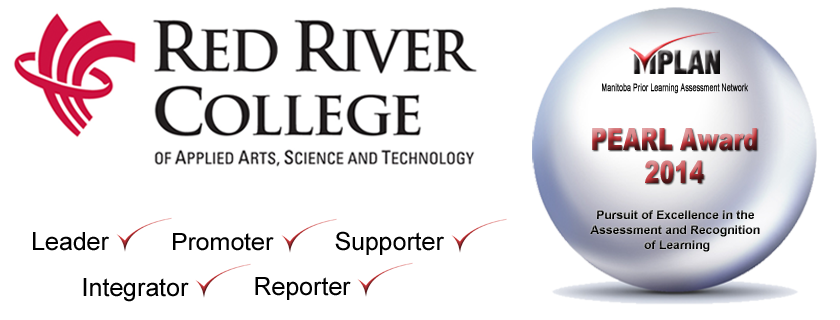
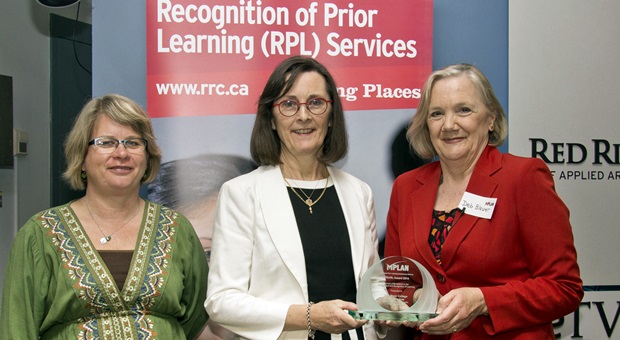
Background for this Award
Manitoba Prior Learning Assessment Network (MPLAN) is a not for profit organisation provincial association. It is made up of those who support the recognition of prior learning. Membership includes industry, workplace, education, government and community practitioners. MPLAN was established in 1994.
Since the early 1980’s, both within Manitoba and beyond, Red River College has been one of a very small group of true leaders in the field now referred to as the Recognition of Prior Learning/RPL. This is the second PEARL Award for Red River College.
Pursuit of Excellence
Red River College (RRC) was one of the first Colleges in this country to initiate RPL practices (in Nursing, Early Childhood Education and Dental Assistant Programs) in the early 1980’s. It has never looked back.
RPL has been the focus of two Strategic Plans 1999/04 and 2005/10 is an integral part of RRC services and programs for learners, faculty, staff, and the external community. As part of RRC’s commitment to the systemic integration of RPL, it has been embedded into course outlines, program calendars, newsletters as well as included in all student recruitment materials and presentations.
RRC has developed and implemented progressive RPL policies and practices based on national and international guidelines and standards. A college wide RPL Committee regularly monitors, evaluates and revises all policies and practices to ensure they reflect changing needs of students and evolution of the College’s mission and goals. The college uses its information systems to record, track, access and disseminate pertinent RPL information and to be accountable for results on an annual basis.
The College has developed a range of RPL professional development opportunities for regular RRC staff and faculty as well as the RPL Practitioner Certificate Program – one of only two such programs in the country.
Results Achieved
Examples are provided here of the extent and variety of RPL Services.
During the five year period (2008/13):
- The college completed 4,896 RPL course assessments for 3096 learners with a 95% success rate.
During the period of July 1, 2012-June 30,2013, the college completed:
- 878 assessments of informal learning from work and life experience using a variety of methods such as test, portfolios, evidence collection, interviews, projects, and skill demonstrations
- 126 assessments of non formal learning from workplace training
Manitoba’s reputation as a leader in RPL in this country would not have been achievable without the example of RRC’s commitment to RPL as well as its countless contributions to learners, staff and external partners (such as MPLAN) made day in and day out by the staff and faculty working with RPL Services at Red River College.
PEARL 2014: University of Winnipeg RPL Services
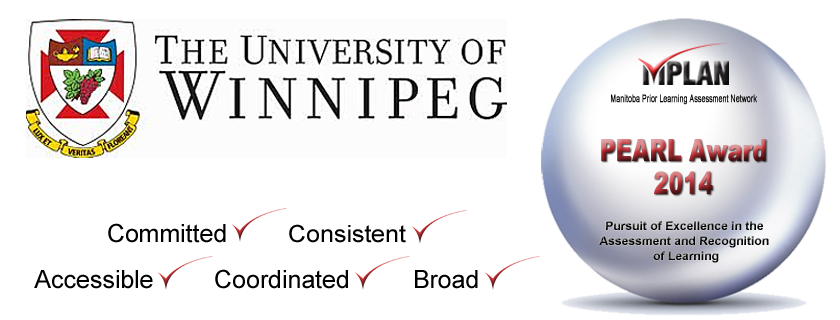
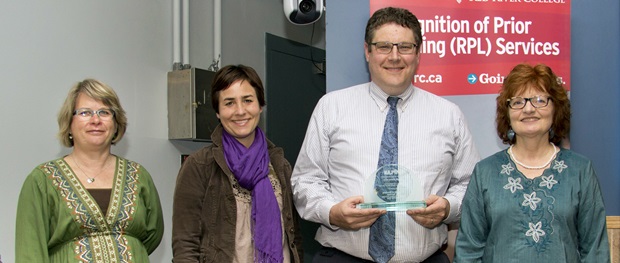
Background for this Award
Manitoba Prior Learning Assessment Network (MPLAN) is a not for profit organisation provincial association. It is made up of those who support the recognition of prior learning. Membership includes industry, workplace, education, government and community practitioners. MPLAN was established in 1994.
In 1999, the University of Winnipeg Senate approved policies and procedures for Prior Learning Assessment and Recognition (PLAR) policies. Since then the U of W has made PLAR accessible across over 400 courses in the Faculties of Arts, Business and Economics, Education, Kinesiology and Science.
Pursuit of Excellence
- As part of its commitment to university-wide implementation, the University established PLAR services in Student Services, Academic Advising:
- to maximise the likelihood of a centralised and consistent approach to policies and procedures.
- to provide a holistic, coordinated and seamless service for all concerned: learners, faculty and staff, the University and the community.
- Professional development with regard to PLAR, has been implemented through internal presentations to faculty/ staff, and administrative and academic councils as well as through information sessions, workshops (e.g. Learning Outcomes: Clarifying their function) and conferences.
- A Competency-based Portfolios initiative is underway in Executive Bachelor of Business Administration (eBBA) program whereby learners will be eligible for up to 15 credit hours based on an assessment of their extensive informal and non-formal prior learning in management positions in the workplace.
- A learning portfolio initiative is in the developmental stages with support from the University’s administration and the Students’ Association.
- As part of its commitment to involvement in the PLAR/RPL community, U of W has been and organisational member of MPLAN since 1999 and of CAPLA since 2000. Within MPLAN, U of W has been consistently active serving as a member of the Board of Directors in various roles continuously since joining.
Results Achieved
- The following RPL Options have been established: Mature Access Admission, Transfer Credit, Military Training and Service and Challenge for Credit (involving Inquiry, Screening and Contract phases).
- As of December 31, 2013 U of W has had 277 Challenge for Credit applications across 28 Departments. There has been a 96% success rate in 124 courses.
- RPL Advising has been established as:
- a safe way for learners to deliberate on the most expeditious way to graduate.
- a support for faculty/staff new to RPL who need help in understanding the policy and the process and what is fair regarding an assessment as well as allowing them to learn what other staff is doing.
- an opportunity to inform staff about flexible assessment.
- a way of enhancing awareness and disseminating information about RPL options on campus.
In summation, after fifteen years in its pursuit of excellence as an advocate and practitioner of RPL/PLAR, the University of Winnipeg is not only achieved a unique stature among Canadian Universities due to the breadth of its RPL/PLAR coverage, but has also established itself within Manitoba as one of the pillars of our very active and vibrant RPL community.
PEARL 2014: WPLAR and WEM
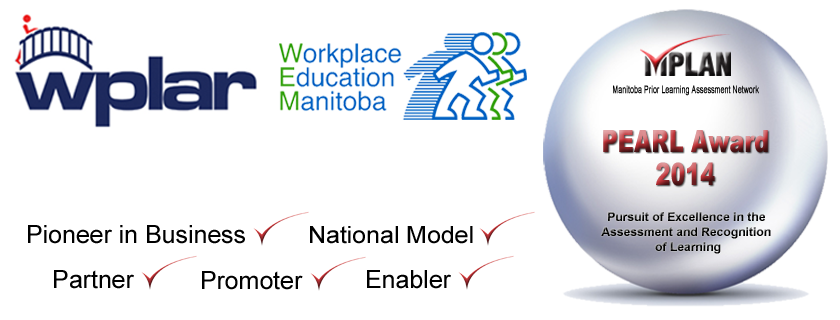
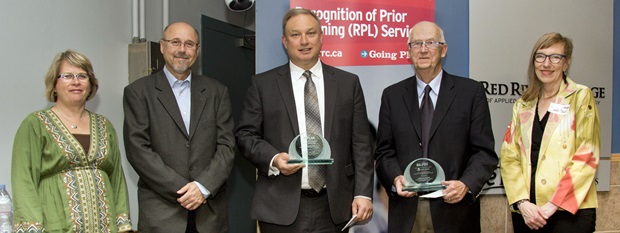
Background for this Award
Manitoba Prior Learning Assessment Network (MPLAN) is a not for profit organisation provincial association. It is made up of those who support the recognition of prior learning. Membership includes industry, workplace, education, government and community practitioners. MPLAN was established in 1994.
This PEARL award to WPLAR and WEM is long overdue. In fact, several winners of the PEARL Award in the past decade have been employers/unions who had benefited from the many RPL/PLAR lessons and supports available from both WPLAR and WEM. In short, without the basic RPL work done by those two organizations, far fewer PEARL Awards would have been made.
Pursuit of Excellence
Despite the fact that its mandate was clearly Essential Skills/ES in the workplace, for over 20 years WEM has also been successfully practising and promoting PLAR/RPL in the workplace. It did this in two ways. First, in an understated way, it simply included RPL as an integral part of its hugely successful ES efforts in workplaces across Manitoba. In addition, strategically speaking, it worked tirelessly to engage both employers and labour unions at the very top levels by treating both ES and PLAR/RPL as long term partnerships among management, unions and government.
For more than a decade WPLAR has followed this pattern and built upon these successes. WPLAR, often working with WEM, has greatly expanded the range of RPL- related activities in Manitoba to include not only workplace projects but also valuable RPL research plus truly impressive development of the PLAR/RPL community of practice.
Results Achieved
- The number of employees who have been assessed for prior learning of the specific Essential Skills relevant to each WEM workplace project over the past two decades has without doubt been very, very large. Unfortunately, these individual assessments were not tracked in a way that would make their numbers available now.
- Just within the most recent five year period of 2008/9 to 2013/4, as part of WEM’s Igniting the Power Within, over 1,200 largely indigenous Manitobans were trained to deliver Portfolio Advisory services. Subsequently, about 800 portfolios were built across rural/northern Manitoba and there have been over 500 RPL related assessments. In addition, 150 RPL practitioners were trained.
- In its first two years of operation, i-WEST( an initiative of WEM) has provided training to immigrant professionals and approximately 150 of them have produced individual e-portfolios.
- In the period 2001 to 2014, WPLAR supported the following initiatives:
- 29 explicitly RPL/PLAR initiatives focussed on specific sectors, occupations, northern communities, disability groups, e.g. aviation maintenance, bus manufacturing, Early Childhood Education professionals, Certified Technicians and Technologists, Midwifery, Internationally Educated Professionals and Trades persons.
- Nine published reports or research projects in RPL related issues including Gap Training, Psychiatric and Mental Health Nursing, PLAR by distance and a PLAR Literature Review.
- Establishment of the website www.wplar.ca which is now an important element in the RPL community in Manitoba as it has enabled RPL Practitioners to communicate with one another about best practices.
- The WEM and WPLAR models are recognised and actively supported within this province by unions and major employers, and also by many sector councils including the largest- Canadian Manufacturers and Exporters.
- Beyond Manitoba:
- WEM and WPLAR have had ongoing success over the years in gaining substantial funding support for ES and RPL from the Federal government.
- The Manitoba model has been adopted by several other provinces (Alberta, Nova Scotia and P.E.I.).
In short, the state of the art in RPL in Manitoba, much lauded across the country, would not be as advanced or as vibrant were it not for the long and untiring efforts in the recognition of prior learning by both WPLAR and WEM.